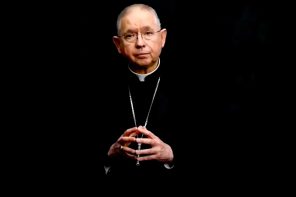Tourist buses are fixtures on Capitol Hill, but the arrival at the Methodist Building of “Nuns on the Bus: Nuns Drive for Faith, Family and Fairness” in noonday heat to the cheers of their colleagues had to be a first. Hustled out by handlers like rock stars, the half-dozen nuns (and one woman who was not a nun but joined the trip anyhow) made their way to a flag-backed stage to join other interfaith leaders in prayer and speeches.
Sister Simone Campbell, a Sister of Social Service and the Executive Director of NETWORK: A National Catholic Social Justice Lobby the sponsoring organization, appeared flabbergasted and delighted by the hundreds who turned out in the midst of the DC region’s massive power outage to welcome them home. Prophets in their own land—in this case, lobbyists among lobbyists—usually get a mixed reception at best.
Fourth of July tourists wondered what was happening, a good question for a broader audience. Why did screaming young Hill staffers, dozens of Muslim women in head scarves, elderly people (both men and women), social justice workers, and lobbyists converge to fête a group of women who traveled 2,700 miles through nine states to visit soup kitchens? I am sure the riders will tell the story in full detail once they get their land legs back, and I know video crews accompanied them. So for now, I offer a word of explanation about what I think the trip means in the big picture of religiously influenced social change.
Bishops in Limos?
Several factors converged to spark the nuns’ creativity. A major one was the passage of House Republican Paul Ryan’s (R-WI) budget, cutting $36 billion from food assistance programs without trimming the military budget or increasing taxes on the wealthy. Mr. Ryan claimed that his ideology was faith-based; indeed that Catholic social teaching justified his approach to push poor people to fend for themselves. The NETWORK people simply did not see it that way, nor did a sizable group of Georgetown University faculty who called Ryan on the carpet. Even the United States Conference of Catholic Bishops, in a tepid letter from their president, Archbishop Timothy M. Dolan from New York, indicated some displeasure. (Mr. Ryan’s theological advisor is probably out of a job by now, or should be.)
Another factor was the Congregation for the Doctrine of the Faith’s mandate issued against the Leadership Conference of women religious. NETWORK was mentioned explicitly as part of the Vatican-perceived problem, related to the support some nuns had provided the Obama administration on health care legislation over against the tantrums of the bishops. That the bishops were embarking on their much-ballyhooed Fortnight of Freedom campaign was a minor theme—although the coincidence in timing resulted in many comparisons, mostly unfavorable, to the men. One blogger joked about the launch of a “bishops in limos” PR counteroffensive. Ouch!
I suspect, though I have no privileged evidence, that the real push for the nuns was a groundswell of support from Catholics and others who realize that it is past the time to listen passively to the bishops rant and rave about religious freedom while running roughshod over other people’s rights. It is tricky business in the increasingly lay-led Church to put too much emphasis on any one group, especially the nuns on whom some people mistakenly confer a quasi-clerical status (nuns are consecrated to religious life, but are not clergy). But in this instance, the bus adventure captured many imaginations and functioned to demonstrate how the free exercise of religion can achieve many good ends for those who will bear the cost.
Resetting the National Moral Compass
I must admit that I thought the whole plan rather hokey at first. The nuns’ bus almost crossed paths with the Romney campaign’s motor coach somewhere in Wisconsin. The Obama bus trip will transverse similar terrain to assure the electorate that our top guys can eat road food and grind out the miles, proving their “common man” bona fides. I was not sure what these simple-living women were thinking of to do the same thing. But they planned their itinerary to stay with friends and religious communities along the way, to visit congressional offices and life-giving projects in which they, their sisters, and colleagues are already engaged ahead of budget cuts. Here’s what I think happened and why.
First, the NETWORK women and their friends demonstrated the power of women in the political/social system. Rather than take the bait and defend themselves as members of communities that belong to LCWR, these women ignored churchmen and instead shone a bright light on the needs of poor and marginalized people that are being met by lay-led ministries (again, nuns are lay people) across the country.
Starting in Des Moines, Iowa, and ending in Northern Virginia before they crossed the bridge in their triumphant return to DC, the bus pilgrims visited all manner of projects. In Dubuque, they saw what several women’s religious communities are doing together to aid newly arrived Americans—immigrants. In Milwaukee, they ate at St. Ben’s meal program, meeting with people who are marginalized and those who dedicate their lives to help them. In Chicago, they visited Mercy Housing, where Mercy Sisters and collaborators “develop, finance and operate affordable, program-enriched housing communities for families, seniors, and people with special needs.”
None of this is glamorous work, and the dining is not gourmet, but it is the stuff of what will move this country from greed to generosity. Many women, including nuns, are in the vanguard, willing to pay the price. Seventy-five members of Congress recorded lovely messages of congratulations for the nuns as the trip ended. I am sure many of them wish they had been aboard so that the good will generated by the nuns might rub off on them. Their messages were diverse and heartfelt, as if they, too, had seen the nation’s moral compass reset for a change.
The “Fortnight” Fizzles
And then there’s the notable fact that the nuns eclipsed the bishops’ “Fortnight of Freedom” without even mentioning it. Apparently official Church efforts are going on all over the country as I write, but enthusiasm has been so low that even the bishops aren’t saying much about it. Even critics have ignored it. So much for a large scale buy-in to their argument that the government insisting on having insurers offer contraception without a co-pay would eradicate religious liberty as we know and love it. Not even the Vatican’s brand new Opus Dei Fox News communication strategist Greg Burke can spin their way out of this failure. Coming on the heels of the conviction of a Philadelphia priest for enabling sexual predators to continue in ministry, what virtually every other diocese did as well, appetite for the bishops’ ideology is all but gone.
With loads of money and all of the apparatus of the institutional Church to back it up, the Fortnight (whose idea was that for a catchy American word?) seems to have fizzled. One event in Boston, for example, featured a large stage, dozens of bleachers, and eight speakers lined up to address the crowd. The audience numbered about 30. Even Timothy Dolan at St. Patrick’s Cathedral in New York City, on the kickoff day of the Fortnight, only gathered 250 people. The nuns got that many in small towns across the country at stop after stop.
The bus trip also proved that there is a deep hunger across generations for this kind of faith-based organizing. The crowd in DC was surprisingly younger than I anticipated—as if every volunteer and internship program in town, every congressional office and lobby group that hires young people had let out for lunch. This is a welcome but too-rare phenomenon, a hint that something new is afoot as many people come to realize what freedom for all really costs, and are willing to pay for it with their lives.
The eldest bus rider was Sister of Social Service Diane Donoghue who, at 81, has done her share of social work. She minced no words in calling the Ryan Budget immoral, with the confidence and conviction that I have come to expect from experienced women who fear no one. When Diane was referred to as the “senior member of the firm,” I jokingly assured the nun next to me that there would be a seat for her on the bus next year. She replied softly that she is 88 and just back from a solidarity visit to Cuba. Why was I not surprised?
A final important dimension of this improbable adventure was the outpouring of interfaith (and non-faith) respect and solidarity. All across the country, people who responded to the nuns on the bus came from a variety of traditions and no faith whatsoever. They seem to be attracted to the women’s gumption to lace up their sensible shoes and get to the work of social change while caring for people in the process.
The Future of Activism
The DC rally included a greeting from Dr. Sayyid Syeed, National Director for the Office for Interfaith & Community Alliances of the Islamic Society of North America with whom NETWORK collaborates. The Society sponsored a DC prayer vigil in solidarity with the nuns last month. It was refreshing to see dozens of women in head scarves in DC applauding the women who had left their veils behind some decades ago, yet all moving in a similar direction on “faith, family and fairness.”
This Muslim group represents a newly energized community, welcome partners with progressive Jews, progressive Catholics, progressive Protestants, and so many others who form a huge and increasingly active network of people working for religiously-inspired social change. This collaborative approach, rather than denomination or tradition-specific efforts, is the wave of the future. The nuns embody it since they are lay people, not official representatives of a church, and are more than willing to work in effective coalitions.
Finally, the message is clear. As the nuns chant it, “reasonable revenue for responsible programs,” the message of the Faithful Budget Campaign, makes a good deal of sense. “Question Austerity” is another of their mantras. Anyone who works in social change realizes that it takes not just grace, as Simone Campbell put it so bluntly, but money. There is no way to justify cutting programs for those who are poor without at the same time expecting that people who are wealthy will pay more than the current tax structures dictate. Messengers like the nuns, who say that without apology, are not naïve. Their rock-star days are numbered; their work is cut out for them.
At the 200th anniversary celebration of the Loretto Community this year, Kim Klein, grassroots fundraiser extraordinaire and a Protestant co-member of Loretto, put her finger on a big reason that relates to why religious communities, which might seem anachronistic to some, are still and increasingly popular. The world does not need experts to make more money or more computers, Kim observed, as we have enough of those. The world needs experts in human relationships if we are to survive and thrive in the 21st century.
We need communities of people who embrace the world, who “hug people to life, not to death” as Simone Campbell put it. If you can still say that after a two-week bus trip, no wonder people are inspired and willing to ante up for a ticket.




